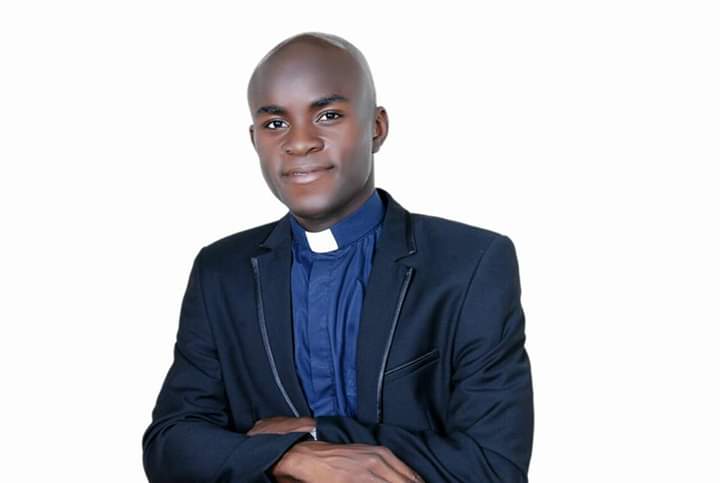Homilies & Reflections
The Solemnity of the most Holy Trinity, Year B by Rev. Fr. Lucas Binnah Junior
First Reading: Deuteronomy 4:32-34.39-40/Resp. Ps: Psalm 33:4-5.6, 9.18-19.20, 22 (R. cf. 12b)/Second Reading: Romans 8:14-17/Gospel Accl.: Cf. Revelations 1:8/Gospel: Matthew 28:16-20
Theme: If God Is Triune, Then We His Children Must Live Trinitarian
The Sunday after Pentecost celebrates the Solemnity of the Most Holy Trinity. Having revealed himself to us as Creator of the universe, the Father of creation, he also showed himself as our Redeemer through the salvific action of Jesus Christ, the Son of God and Son of Man when humanity sinned against God. The process of creation and redemption was achieved through the power of the Holy Spirit, the Sanctifier. In all these, we see God as triune, a community of three Divine Persons, three Persons in One God, equal in power and essence. God is one who is not a Deus absconditus (a run-away God), a God who created and left humanity to cater for itself. Not at all! The God of the Bible is a God who is actively involved in human history and affairs; a God who intervenes in our lives and who is called Emmanuel, which means “God-with-us” (Is. 7:14, Mt. 1:23). This is the nature of the God we serve as Christians. All the Abrahamic faiths namely, Judaism, Christianity and Islam believe in one God, but for majority of Christians, this monotheistic God reveals himself in three Persons. Thus, God is a Monotheistic Trinity. Today’s readings focus our attention on this belief and how best we can live a practical Trinitarian life.
In the first reading, Moses tells the Israelites that “The Lord is God in heaven above and on the earth beneath; there is no other” (Deut. 4:39). By this statement, Moses expresses the monotheistic faith and underscores the point that, there is only one God, who is incomparable, uncreated, and who shares his glory with no one else (cf. Is. 42:8). If this is the nature of God, then, according to the Psalmist, those who believe in God should consider themselves blessed: “Blessed are the people the Lord has chosen as his heritage” (Ps. 33:12b). How do we become the chosen heritage of God? We do so through baptism “in the name of the Father and of the Son and of the Holy Spirit” (Mt. 28:19b). By this, we become members of the family of God, and qualify to call God our Father. According to St. Paul in the second reading, “we have received the Spirit of sonship, in which we cry, ‘Abba! Father!’”(Rom. 8:15). Indeed, it is a great privilege to be adopted as sons and daughters of God, children of God, and people who are brothers and sisters of Jesus Christ. In consequence, we are “a chosen race, a royal priesthood, a holy nation, a people set apart” (I Pet. 2:9). For this reason, we join the author of the book of Revelation to acknowledge and adore the triune God, and pray: “Glory be to the Father, and to the Son, and to the Holy Spirit: to God who is, who was, and who is to come” (cf. Rev. 1:8).
To clear all doubts about his divinity, Jesus says “I and the Father are one” (Jn. 10:30). Again, he makes a personal claim to authority over heaven and earth when he tells his disciples “All authority in heaven and on earth has been given to me. Go therefore and make disciples of all nations, baptising them in the name of the Father and of the Son and of the Holy Spirit” (Mt. 28:18-19). Here, in a single breath, Jesus highlights the equality and common authority of the three Persons. This is the power that will accompany all who will witness to the risen Lord. In this revelation, we see God as a family who wants others to become members of his divine community. As a matter of fact, God wants people from all nations, backgrounds, affiliations, etc, to become members of the divine family through faith in one baptism, one Lord and one Spirit. If this is the vision of the triune God for us, then what are we to do as his children?
Definitely, the Trinity has implications for all humanity and particularly, Christians. It has religious, social, economic and other implications for us. If we believe God is triune, then our belief must translate into practical Christian Trinitarian lifestyle. Because the triune God is One, all forms of idolatry must be avoided. Again, because God is love, and true love is outward-looking and selfless, God lives in community as the Father and the Son and the Holy Spirit. In other words, in love, the Lover looks for the Beloved in order to share love. As the second reading explains, if we are the “children of God” (cf. Rom. 8:16), then we also need to live as a community of people bound by love, equality, unity, respect and a sense of belonging. Too often in the world, we are separated by physical and spiritual barriers. Physically, the division may be in terms of race, culture, colour, sex, age, unjust social structures and exploitative trade policies. Spiritually, it may be on the basis of pride, envy, jealousy and religious bigotry. These should give way to dialogue, fellow-feeling, fairness, justice, collaboration and mutual understanding.
Furthermore, we should see all humans as Imago Dei (Image of God). Looking down on other human beings because they are different, speak different language, think and behave differently with a different worldview, is looking down on God, which in itself constitutes a grave sin. No human person is a second-class child of God! By virtue of our baptism in Christ, we are “no longer strangers or sojourners, but fellow citizens with God’s people and members of the household of God” (Eph. 2:19). The summons of unity could not have come out clearer than this! Feeling superior is actually an inferiority complex; for why would one feel better than others when it is a fact of life that both the rich and poor, sick and healthy, white and black all end up with the same fate, death? Job says it more succinctly: “Naked I came from my mother’s womb, naked I shall return” (Job 1:21). As believers, we are to build bridges rather than walls; be bastions of hope rather than centres of despair; friends rather than foes; human and humane rather than beast and cruel; sympathetic and empathetic rather than be unconcerned and difficult. Thus, we need to respect the otherness of the other. There must be unity in diversity.
Dearly Beloved, the Trinity is an indication that life is relational and complementary, rather than competitive. Life is an ecosystem of relationships and interdependence. Every creature has its own value and significance. Humans depend on plants and animals, and vice versa. That is how the Creator made it: we are co-creatures. This implies we are to care for the environment which is our common home. Destroying the environment through exploitation is a dent on our image as God’s creatures. In his encyclical, Laudato Si (no. 23), Pope Francis says: “The climate is a common good, belonging to all and meant for all. At the global level it is a complex system linked to many of the essential conditions for human life.” So, all are members of the ecosystem, and no matter how each one looks, without each other, the chain is incomplete, and there will be a missing link. We should discover God in all things and embrace ecological conversion. We all need one another, and no one is an island. A couple need each other in order to be complete. Masculinity and femininity are complementary. God never made a mistake in bringing siblings from the same parent. If God is relational, and does not find it offensive to relate with us, then we have no right whatsoever, to look down on others. It is unchristian and anti-Christian to do so! Let us pray that God may touch our hearts with deep love for one another so that our relationships will be a true reflection of our Trinitarian belief. God bless us. Happy Holy Trinity!
Remember: #If-God-Is-Triune-Then-We-His-Children-Must-Live-Trinitarian#
By Rev. Fr. Lucas Binnah Junior, C.S.Sp
Sharing is caring!
Ghana Catholic News aim to provide up to date news on the Catholic Church in Ghana on various disciplines such as diocese, priesthood, programs/events, promoting of the Catholic faith, daily readings, homilies, Catechism, etc.





